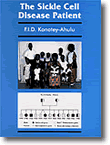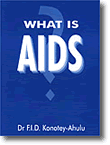Comments on Dr. Konotey-Ahulu
1972 Professor Helen Ranney MD, Albert Einstein College of Medicine, New York, in Sickle Cell Disease, Editors H. Abramson, J.F. Bertles, Doris Wethers (C. Mosby Co.) 1972 p 320:
"There is no single clinical experience in the United States comparable to that of Dr. Konotey-Ahulu."
1985 Distinguished Professor of Internal Medicine Dr. Maxwell Wintrobe MD PhD, University of Utah, USA, in his book Haematology, The Blossoming of a Science - A Story of Inspiration and Effort (Lea & Febiger, Philadelphia) 1985 pp 378-380:
"Dr. Konotey-Ahulu has contributed to our understanding of the clinical manifestations of sickle cell disease and other haemoglobinopathies in Africa ... His contributions are especially noteworthy; the value of his work has been widely recognised ... He has become increasingly involved with ethical matters and genetic counselling and has strong views against antenatal diagnosis and selective abortion."
1991 Professor Sir David Weatherall FRS MD FRCP FRCPath, Oxford University, in Lancet June 29, 1991, Vol. 337 p 1590:
"The Sickle Cell Disease Patient' is a fitting tribute to a physician who has done as much as anyone to improve facilities to deal with this condition in Africa."
1991 Professor Roland Scott MD, Washington DC
"This book is a meritorious addition to the medical literature and Dr Konotey-Ahulu has been disclosed as a seductive narrator as he tells the story of Sickle Cell Disease" (Foreword to The Sickle Cell Disease Patient 1991).
1992 Professor D Geraint James MD FRCP Royal Free Hospital, London University
"This thesaurus or treasure trove of information adds a new dimension to the world of sickle cell disease". (Book Review of `The Sickle Cell Disease Patient' in Sarcoidosis Volume 9, 1992 p 73.)
1993 Professor A J Bellingham MB FRCP FRCPath, King's College Hosp., University of London
"This remarkable study must represent the largest compilation and report of a single person's clinical experience ... For professionals working within the communityand hospital I can recommend it as a marvellous feast to delve in". (Tropical diseases Bulletin, 1993, Vol 90 No. 3, p 164).



